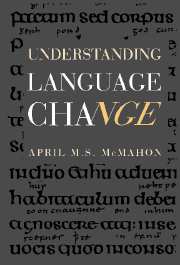Book contents
- Frontmatter
- Contents
- Preface and acknowledgements
- 1 Introduction
- 2 Three views of sound change
- 3 Sound change 2: the implementation problem
- 4 Morphological change
- 5 Syntactic change 1: the Transparency Principle
- 6 Word order change and grammaticalisation: language change and general laws
- 7 Semantic and lexical change
- 8 Language contact
- 9 Linguistic variation
- 10 Pidgins and Creoles
- 11 Language death
- 12 Linguistic evolution?
- Bibliography
- Index
8 - Language contact
Published online by Cambridge University Press: 05 June 2012
- Frontmatter
- Contents
- Preface and acknowledgements
- 1 Introduction
- 2 Three views of sound change
- 3 Sound change 2: the implementation problem
- 4 Morphological change
- 5 Syntactic change 1: the Transparency Principle
- 6 Word order change and grammaticalisation: language change and general laws
- 7 Semantic and lexical change
- 8 Language contact
- 9 Linguistic variation
- 10 Pidgins and Creoles
- 11 Language death
- 12 Linguistic evolution?
- Bibliography
- Index
Summary
Introduction
In the first seven chapters of this book, we have mostly been treating languages as isolated and self-contained, and linguistic changes as internally motivated. This, of course, is downright misrepresentation, since the majority of the world's speakers are probably at least bilingual, if not trilingual or multilingual: and bilingualism necessarily means linguistic contact. In contact situations, elements can be transferred from one language to another; and in this chapter, we shall examine the effects of such transference. Section 8.2 will focus on lexical borrowing; structural features other than words can also be borrowed, as we shall see in 8.3. Finally, in 8.4, we shall consider convergence, the mutual sharing of features among members of an areally defined set of languages, whose speakers tend to be in a state of stable bilingualism.
Lexical borrowing
The term borrowing is a fairly recent label for what used to be called ‘mixing of languages’ (see 8.4 below). We shall follow Haugen here in using the term borrowing for ‘the attempted reproduction in one language of patterns previously found in another’ (1950: 212), restricting ourselves at present to the lexicon. Of course, as Haugen notes, the donor need not be aware of the loan and does not consent to it, while the recipient need not repay it; but since alternative metaphors, like stealing or adoption, are at least equally absurd, we shall stick to borrowing.
We must begin by emphasising that language contact, and therefore borrowing, relies on bilingualism.
Information
- Type
- Chapter
- Information
- Understanding Language Change , pp. 200 - 224Publisher: Cambridge University PressPrint publication year: 1994
